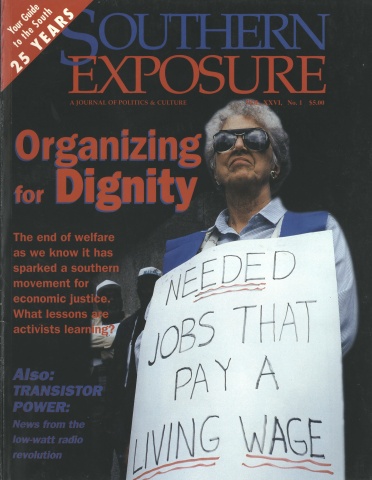The Redneck Shop

This article originally appeared in Southern Exposure Vol. 26 No. 1, "Organizing for Dignity." Find more from that issue here.
In recent years South Carolina has received national attention for its racial antagonisms, spurred by events such as the flying of the Confederate flag over the statehouse and church burnings. Another chapter in the state’s story of racial division began on March 1, 1996, when the Redneck Shop opened its doors in the town of Laurens.
Laurens is a town of 9,700 situated some 30 minutes southeast of Greenville. The store’s proprietor is John Howard, who was an official in the Keystone Knights of the Ku Klux Klan. But Howard claims to be retired and says that the shop’s purpose is to “teach people about the Klan, not spread bigotry.”
When you enter the Redneck Shop what you see are Klan robes, photographs, T-shirts and even skulls that clearly spread bigotry. I walked through the shop shortly after it opened, while over 300 people had gathered outside in protest. The spirit inside the Redneck Shop was smug and hateful, while the spirit of those gathered outside, both black and white, was loving and hopeful. Despite the public outrage, however, the store still operates today.
Wearing black and white ribbons, people gathered in March for the rally organized by Rev. David Kennedy, who is the pastor at the New Beginnings Baptist Missionary Church in Laurens. One of those people was Becky McAllister, who said that “it makes me ashamed to say I was born and raised in South Carolina. I’m ashamed to be white. I want people to know that not all white southerners are racist.”
Kennedy became involved because he wanted to stand with African American youth in Laurens who were extremely angry when the Redneck Shop opened its doors. Kennedy, who has photographs of Martin Luther King Jr. on his office walls, wanted to teach the possibilities of non-violent protest — a spirit that ran through the demonstration.
Over the last two years, there have been a number of smaller protests and national figures like Jesse Jackson have visited Laurens, but the Redneck shop is still in business. Some local people — both black and white — say the shop is not just a museum, but a meeting place and recruiting ground for the Klan.
The two-year history of the shop has not been uneventful and the past year’s events can be described as peculiar. Howard has claimed that he has been persecuted and sued an African-American city councilman for defamation of character. On two occasions rocks were thrown through the store’s window and a Columbia man drove his van through the shop’s front door. John Howard’s son was jailed in May 1997 for spraying pepper gas in the faces of African-American teenagers outside of the shop and then charged that he was beaten in the city jail. It was in the early summer of 1997, however, when events took a strange turn.
The building that housed the Redneck Shop, the old Echo Theater, was owned by Michael Burden, a John Howard protege and young member of the Klan. The store was actually Michael Burden’s idea, and he legally gave Howard the right to operate the shop with no rent for as long as he lived. But Burden and Howard had a disagreement that led to Burden being unemployed and homeless. Burden, his new wife and her two children were living in the back of his truck.
Who did Burden end up asking for help? Rev. Kennedy. The minister fed Burden and his family and found them a place to live. A grateful Burden went to the pulpit of Kennedy’s congregation and publicly thanked them, while expressing regret to the African-American community: “I want to apologize for causing an eyesore on Laurens. At one point, I believed in this. But it was the wrong belief.”
In appreciation to Kennedy and the church, Burden decided he wanted the church to have his building. Although Kennedy insisted Burden give it more thought, Burden was persistent and the church bought the old Echo Theater for $1,000 — making the African-American church the new landlord of the Redneck Shop.
As if this irony is not enough, Burden is reportedly back at the shop.
The story of the Redneck Shop is a peculiar one. But at essence it is about the ongoing battle between the institutions of racism and those like Rev. Kennedy who lead us in the continuing fight for unity.